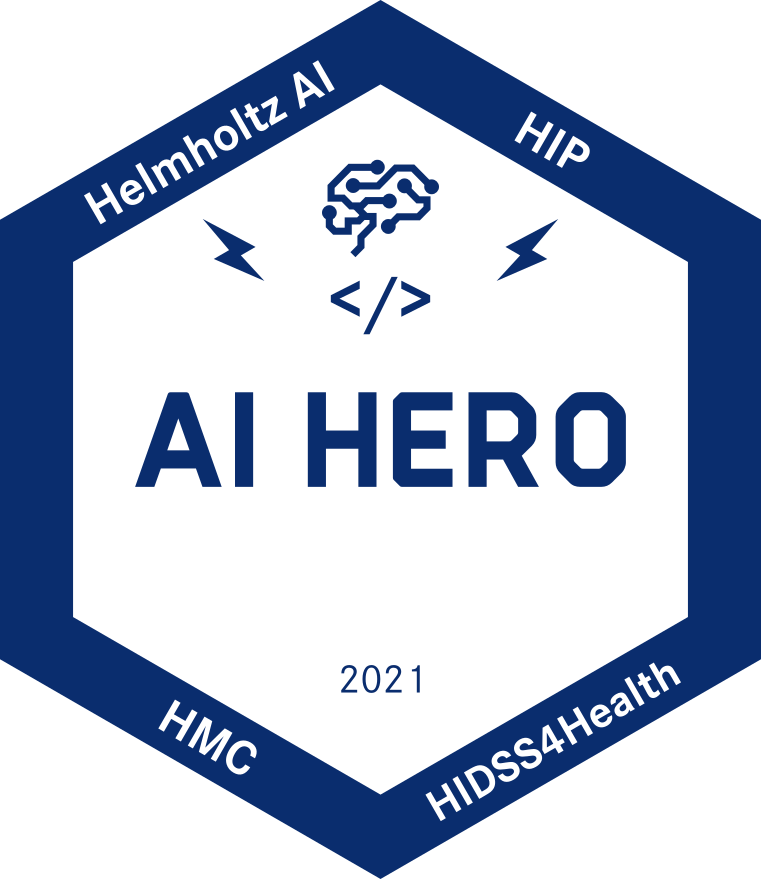Welcome to the first
AI-Hero Hackathon on Energy Efficient AI

We are excited that you are interested in becoming a part of this challenge.
Goal
This hackathon will feature two challenges: a use-case from the research field of health and a use-case from the research field of energy. Each task will be tackled by 6 teams of three participants. The main focus of the tasks is not a development of the model that achieves higher accuracies, but rather finding and optimizing a model and its training to minimize energy consumption while still maintaining a target accuracy.
Registration
Please first register via the Indico system (first-come-first-serve, if your preferred challenge is full, you can still register and will be put on the waiting list). If you are registering as a group, you can also indicate wishes for team members, which the organizers will try to accomodate while assigning the teams.
You will then have to register with the HAICORE Compute Ressources @KIT by filling out this Form and sending it to consultant-helmholtz.ai@kit.edu.
Deadline for handing in the HAICORE access form is December 17th, 2021, as it will take our HPC department a bit to approve them.
We want to make sure that HAICORE registration and system setup are finalized before the event, so you will have to run a short test-script on HoreKa upon first login.
You then need to provide the personalized registration token you get from the script in the Indico system to finalize your registration.
Deadline for uploading the token is 1 week prior to the event (24th of January).
IMPORTANT:
If you have not uploaded your personalized HoReKa token, your registration will be incomplete and your spot will be given to someone on the waiting list.
Requirements
You should:
-
be an advanced AI-researcher with experience in model development, training and optimization
-
be familiar with accessing/working on HPC-systems (i.e. linux, ssh-connections)
-
have some experience in job.submission via batch-systems (SLURM, LSF, etc.)
-
bring advanced python programming skills
For the Health challenge you should bring:
-
experience with training and configuring deep neural networks for vision tasks
-
ideally some experience with either pytorch or tensorflow
For the Energy challenge you should bring:
-
experience with the analysis of time-resolved data, either via statistical methods or deep learning approaches (RNNs, LSTMs, Transformer)
Agenda
We would like to give you as much freedom and flexibility in working on your task as possible, so there will be little agenda points over the course of the hackathon.
Tuesday (Feb 1st), 9.00 am - Kick-off session with introductory talks
Thursday (Feb 3rd), 4.00 pm - Wrap-up and winner announcement
IMPORTANT:
Participation in the initial session is mandatory to all participants, as it will give you introduction to the challenges and datasets, and you will be assigned to your team. If you do not show up for this session, we cannot assign you to a team, and your participation is hence forfeit.
Apart from the initial and the final session, you are free to work on your task, whenever, wherever and how you deem fit for your team. In case you need help with anything, our orga team will be available between 9am and 5pm on all days (Helpdesk hours).
Evaluation
Energy consumption will be measured over the entire development process (development-trials, training and inference). This means each of these steps have to be run on the provided HAICORE resources. Hence, you will need to apply for HAICORE access prior to the event (Details in the Registration Section). For final evaluation, the overall energy consumption, the final training consumption and the inference consumption on a test dataset will be weighted along with the model's accuracy. The detailed evaluation scheme will be presented at the hackathon. Winning teams will be awarded with cool prices, kindly provided by our sponsor Lenovo. Due to fairness, we will employ a strict non-cheating policy: Running any model development steps on compute resources other than the ones provided will lead to immediate disqualification of the team from the competition.
Open-Science
To promote and live an open-science mindset, the final trained model together with all necessary meta-information to run the model will have to be uploaded to Zenodo. This will be counted into the evaluation and ranking process. Details on the format in which to upload your model as well as a backbone template will be provided by the Helmholtz Metadata Collaboration (HMC).
This Hackathon is brought to you by





